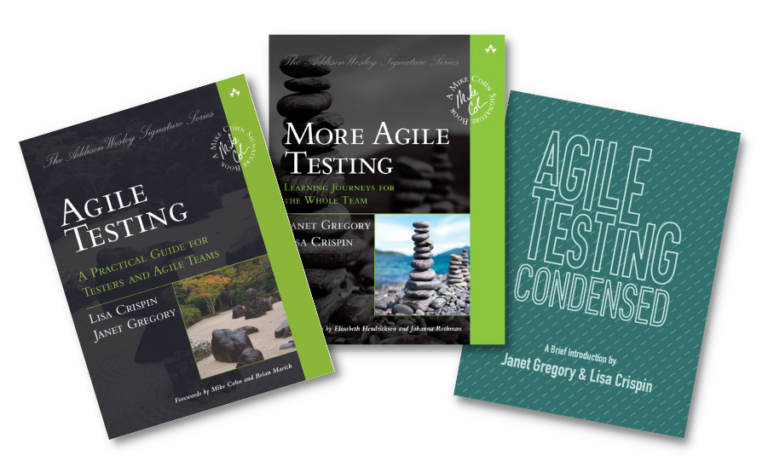Thanks to everyone who posted ideas on ways conferences can be more inclusive of newcomers and avoid the perception of having “cliques” of speakers and veteran attendees, in response to my post. I’d like to share some of them here.
Liz Keogh‘s keynotes and workshops are always so inspiring and helpful to me. A few years ago she took time in the lobby of the conference hotel to explain ways I could use Cynefin (TM) to help with testing. She suggests giving speakers (or anyone!) signs or cards to pass along, saying when we’re available for random conversations. She added that “newcomer” is a welcoming term for first-year participants; other labels often imply lack of experience or skill.
On the topic of labels, Elizabeth Zagroba suggests we give people the option to identify as newbies, speakers, or whatever. Conference organizers could give each attendee stickers or labels along with their badge, and each person can opt to attach them or not. Elizabeth also related her practice of introducing herself to whoever is sitting next to her right before a session starts. That way she doesn’t have to think of something to say immediately. That’s a great lead-in to a conversation after the session.
Emily Webber says that at meetups, she has given people a question to ask of someone they haven’t met before. “It helps to open a conversation when you have words to use”, she advises. Emily is an outstanding speaker and community builder. I’m definitely going to try that idea.
I’ve watched Stephan Kämper go from a new conference participant to an experienced workshop presenter/facilitator over the past 9 years. At conference lunchtime, he sits at an empty table and waits for others to ask to join – which of course they do. He explains, “Apart from getting to have lunch with someone I may not know yet, I don’t have to ask to join a table. Yes, I’m an introvert.” He likes having the labels on the nametags to know if someone is a rookie, alumnus, speaker, volunteer or organizer. It helps him reach out to first-time attendees. I have to say that I also like the way these labels can help start a conversation. I always thank volunteers that I see. And I can ask questions like “What are you speaking about” or “How does this year compare with last year” or other questions, depending on what I read on the badge.
Ingrid Sutherland notes that it’s up to veterans and newcomers to create the conference atmosphere, but that’s difficult if speakers are treated as celebrities. She tweeted, “I don’t want to be a groupie, I just want to say thank you or ask a question”.
As a speaker, I sure don’t want to be treated as a celebrity. The reason I speak at conferences (which is way outside my comfort zone, even though I’ve been doing so for decades) is so that I can attend the conference, meet people and learn new ideas. If I don’t get a chance to talk to other participants, my learning is going to be awfully limited.
Several people said that the CollabLab at Agile Testing Days, as well as TestLab and similar activity centers at other conferences, are particularly inclusive and everyone, including newbies, get lots of help there. I talked to several first-time attendees who got help with public speaking skills in the CollabLab. Several Agile Testing Days attendees also raved about the Agile Games Night as a wonderful place to get to know people in a comfortable, safe and fun place. I heard from TestBash Philly attendees that the TestBash Circus there was a fun and inclusive activity. Richard Bradshaw shared a link describing it, but I’d love to hear from more people who got to experience it.

We had lots of first-time folks at the Agile Testing Days Lean Coffees, and several of them told me they really appreciated the opportunity to get to discuss a variety of topics with a variety of people. If your next conference doesn’t have a Lean Coffee, consider hosting one yourself.
If I failed to include your suggestion, please leave a comment. I was so excited to get so much feedback on this.



2 comments on “More ideas for making conferences inclusive!”
Having some form of visible coding on attendees’ badges is a practice found in other conferences/conventions; for example, the World Science Fiction Convention uses ribbons attached to conference badges to identify roles and/or languages spoken (this was particularly useful when the convention has been held outside the US).
The question of whether speakers are celebrities or not affects other sorts of conferences, too. It’s a bit disconcerting when you’re chatting with a friend only to be interrupted by someone asking for your friend’s autograph because they see them as a ‘celebrity’ whereas you think of them as just plain “Dave, who I’ve known for years”.
And there’s always the risk of making assumptions about someone because of their role. I’m attending my first test conference next March (TestBash in Brighton, UK). It will be a bit odd for me because I’ve attended any number of conferences in Brighton in a completely different field over the past twenty years, often speaking at them (and in a far bigger venue than the one TestBash is held in!)
The growth of the testing community, especially in the UK and Europe, is a fairly recent thing, and the community’s self-identification as a community is still developing. An increased shared consciousness by the community of its own identity is going to be the best way of neutralising any tendency to identify people as ‘celebrities’. Eventually, we can all be Dave (or Davina).
Thanks, Robert, I’ve only ever been to software conferences, so it’s interesting to hear that these issues exist for other types of conferences.
So glad you get to go to TestBash Brighton, another of my favorite conferences!
It’s great to see the testing community grow. Back in 2009 I went to my first testing conferences in Europe, SEETest and Agile Testing Days, there were few other testing conferences then. Now we are spoiled for choice! I’m encouraged by the many new voices/faces we see at conferences, especially TestBash and Agile Testing Days, which actively encourage and support them.